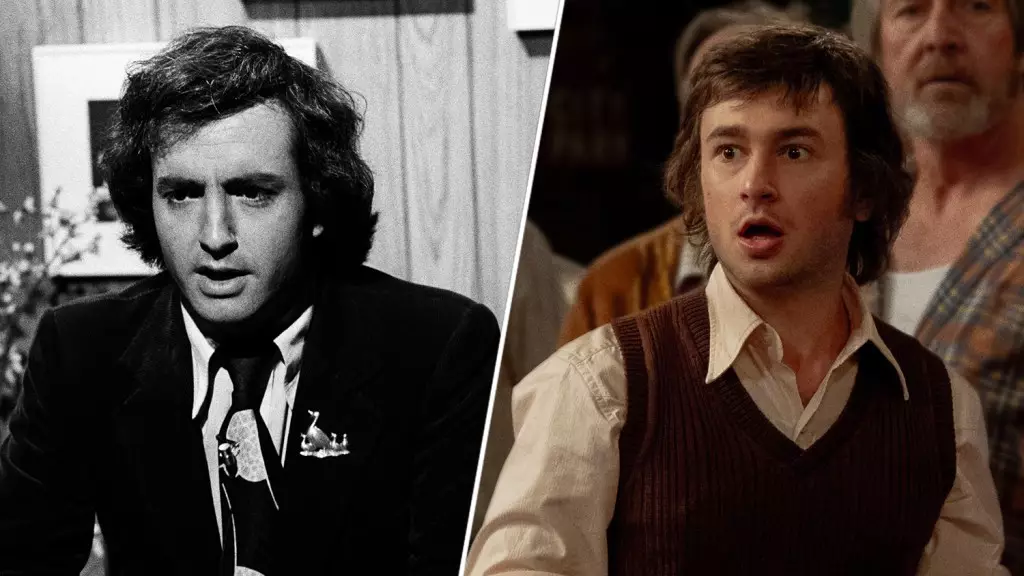Gabriel LaBelle’s recent foray into the realm of nonfiction cinema offers audiences a unique glimpse into a pivotal moment in television history. In his portrayal of Lorne Michaels in the highly anticipated film ‘Saturday Night,’ LaBelle got more than just script lines; he experienced the vibrant energy of 30 Rockefeller Plaza during a live Saturday Night Live (SNL) taping. Set to premiere nationwide on October 11, the film chronicles the dramatic events leading up to the very first broadcast of SNL on October 11, 1975. Rather than merely focusing on the laughter and sketches that would define the show, the film delves into the chaos and creativity that characterized this groundbreaking era.
During a recent conversation with IndieWire, LaBelle recounted the extraordinary experience of attending an actual taping of SNL. He revealed that immediately following their first few days of shooting in New York City, the cast was invited by Michaels himself to attend a live episode featuring Josh Brolin. This opportunity allowed LaBelle not only to observe the fast-paced environment of a live television show but also to witness the collaborative spirit that has become synonymous with SNL.
Engaging with legends of comedy and television is a significant experience for any actor, and LaBelle felt that weight during his brief encounters with Michaels and other critical figures from the SNL world, including director Jason Reitman and producer Peter Rice. Although LaBelle described his interactions as limited, the glimpse into the world of creative masterminds showcased the mutual respect that exists between generations. He noted that the atmosphere was informal and relaxed, which allowed for genuine interactions even amidst the high stakes of live television.
Interestingly, the film portrays not just the sketches but also the tumultuous relationships and creative tensions that were present behind the scenes. This resonates with viewers who understand that comedy often comes from a place of conflict and discourse. By weaving these narratives together, ‘Saturday Night’ offers a richer view of what it means to create humor in a collaborative environment.
Originally titled SNL 1975, ‘Saturday Night’ focuses on a historic 90-minute window that leads to the airing of SNL’s inaugural episode. As audiences might expect, this film navigates the complicated dynamics among a group of luminary comedians, showcasing how their combined talent reshaped television. Through the lens of various characters—portrayed by a diverse and talented cast including Rachel Sennott as Rosie Shuster and Dylan O’Brien as Dan Aykroyd—the film captures the highs and lows of comedy writing and performance.
LaBelle, reflecting on the portrayal of Michaels, mentioned uncertainty about whether the iconic producer has seen the film. Reitman, during a festival appearance, confirmed that even he did not know Michaels’ feelings regarding the project, emphasizing the enigmatic nature of the man. This adds a layer of intrigue, as fans and newcomers alike are eager to understand Michaels’ perspective on such a personally significant stage in his career.
With a cast featuring talents like Ella Hunt as Gilda Radner and Willem Dafoe as David Tebet, ‘Saturday Night’ combines youthful energy with seasoned performance. This blend is crucial in portraying the transitional moment in comedy, bridging the gap between emerging talent and established figures. The film seeks not only to commemorate a television milestone but also to celebrate the collaborative spirit and creative chaos that drove it.
As the premiere date approaches, anticipation heightens around whether Michaels will ultimately view his onscreen portrayal. It is evident that for those involved in ‘Saturday Night,’ this project is less about personal accolades and more about honoring a beloved cultural institution. As LaBelle’s journey reveals, the intersection of history, artistry, and personal expression creates a compelling tapestry worth exploring.
The narrative behind ‘Saturday Night’ is not merely a story about a television program; it’s a reflection on how innovation emerges from creative risks and collaborative endeavors. It serves as a reminder that the essence of comedy lies in its ability to unite, challenge, and inspire, leaving audiences eager for its October debut.


Leave a Reply